

Online Student Forums with Experts. Key Takeaways Asynchronous collaborative learning forums between students and experts can result in highly effective learning experiences beyond what the instructor can provide.
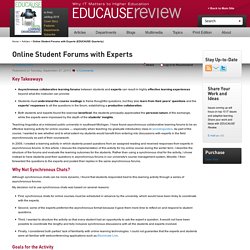
Students must understand the course readings to frame thoughtful questions, but they also learn from their peers' questions and the experts' responses to all the questions in the forum, establishing a productive collaboration. Both students and experts found the exercise beneficial: the students principally appreciated the personal nature of the exchange, while the experts were impressed by the depth of the students' insights.
Teaching linguistics at a midsized public university in southeast Michigan, I have found asynchronous collaborative learning forums to be an effective learning activity for online courses — especially when teaching my graduate introductory class in sociolinguistics. Why Not Synchronous Chats? My decision not to use synchronous chats was based on several reasons: Goals for the Activity Dr. A Case Study in Planning Online Interaction. Captain L.
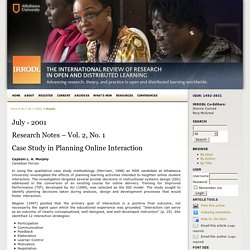
A. Murphy Canadian Forces In using the qualitative case study methodology (Merriam, 1998) an MDE candidate at Athabasca University investigated the effects of planning learning activities intended to heighten online student interaction. The investigation targeted several pivotal decisions in instructional systems design (ISD) addressed in the conversion of an existing course for online delivery. Training for Improved Performance (TIP), developed by AU (1990), was selected as the ISD model. Wagner (1997) posited that the primary goal of interaction is a positive final outcome; not necessarily the agent upon which the educational experience was grounded. ParticipationCommunicationFeedbackElaborationLearner ControlMotivationNegotiationTeam BuildingDiscoveryExplorationClarificationClosure The research problem involved the conversion of an on-campus post-secondary course to online delivery.
With respect to six study questions the following conclusions were drawn: Merriam, S. Case Study: Teaching banking + Finance Online. Case Study 2: The Open Course Library of the Washington State Colleges. A case study from Game Changers Tom Caswell This chapter is licensed under a Creative Commons Attribution 3.0 Unported License This case study describes an initiative of the Washington State community and technical colleges called the Open Course Library (OCL).
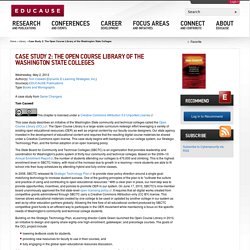
The Open Course Library is a large-scale curriculum redesign effort leveraging a variety of existing open educational resources (OER) as well as original content by our faculty course designers. Our state agency invested in the development of educational content and requires that the resulting digital course materials be shared under a Creative Commons open license.
The State Board for Community and Technical Colleges (SBCTC) is an organization that provides leadership and coordination for Washington's public system of thirty-four community and technical colleges. In 2008, SBCTC released its Strategic Technology Plan to provide clear policy direction around a single goal: mobilizing technology to increase student success. Case studies for flipped classrooms at the University of Queensland, Australia. The following case studies demonstrate a variety of approaches that teachers at UQ are taking to flip their classrooms.
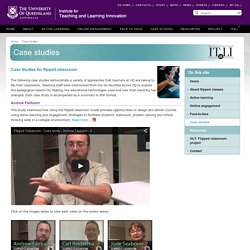
Teaching staff were interviewed from the six faculties across UQ to explore the pedagogical reasons for flipping, the educational technologies used and how their teaching has changed. Each case study is accompanied by a summary in PDF format. Andrew Fairbairn This study examines how using the flipped classroom model provides opportunities to design and deliver courses using active learning and engagement strategies to facilitate students’ teamwork, problem solving and critical thinking skills in a collegial environment.
Read more ... Click on the images below to view each video on the screen above Second and third-year Archaeology courses in the BA major Engineering Design, Engineering Modelling & Problem Solving Literary Studies, School of English, Media Studies, and Art History The Science of Every Day Thinking (2nd Year); Judgement and Decision Making (3rd year) Making history with iPads, peer assessment and MyPortfolio. Dr Paul Walker, CALT, and Dr Zubin Mistry, UCL History, presented attendees at the UCL Teaching and Learning Conference 2014 with a pioneering first-year undergraduate history module.
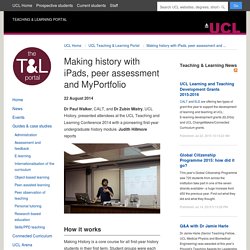
Judith Hillmore reports How it works Making History is a core course for all first-year history students in their first term. Student groups were each asked to choose a historical question related to UCL’s London environment from a list constructed by staff. Students then had the term to complete their research and to present their findings. Technology In order to help them create online content for their project reports, students were given iPad Minis, which had been purchased by the department.
At the UCL Teaching and Learning Conference, Dr Paul Walker used this presentation to explain the team's findings.